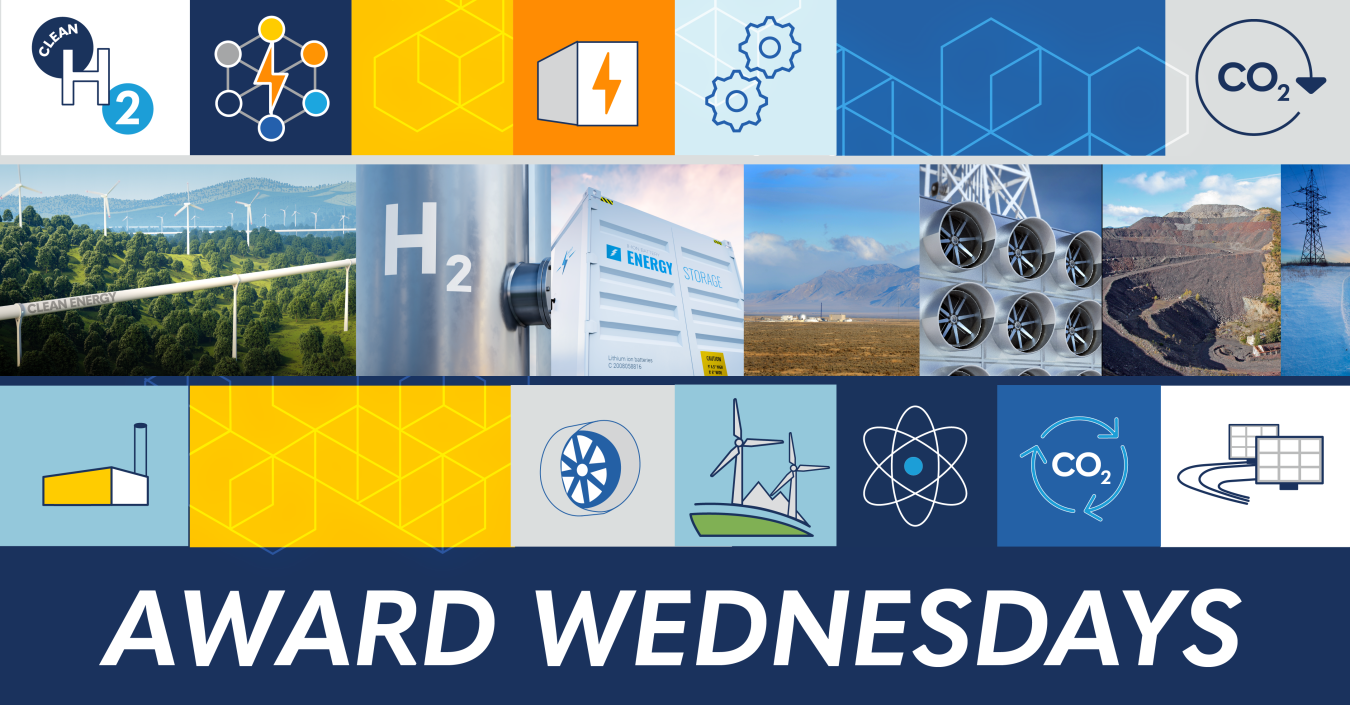This week's awards: H2Hubs Gulf Coast and Midwest Hydrogen Hubs; IDP's Zero Waste Advanced Aluminum Recycling; CC Pilots' Carbon Capture Pilot at Big Spring Refinery; ERA's Clean Energy in the Northwest Arctic
Office of Clean Energy Demonstrations
November 20, 2024
On Wednesdays, OCED will announce the latest projects that have successfully completed award negotiations. OCED will only issue an Award Wednesday notification on weeks when an award has been finalized.
AWARD ANNOUNCEMENTS
Industrial Demonstrations Program
Zero Waste Advanced Aluminum Recycling (Project ZAAR)
OCED awarded the Zero Waste Advanced Aluminum Recycling (Project ZAAR), led by Real Alloy Recycling, with more than $3 million (of the total project federal cost share of up to $67.3 million) to begin Phase 1 activities. Real Alloy Recycling plans to construct a zero-waste salt slag recycling facility in Wabash, IN. This project aims to build a processing plant on the backend of an existing aluminum recycling facility to enable salt slag components, which are typically sent to landfills, to be recycled back into the aluminum recycling process or beneficially used in other industries such as cement. During Phase 1 of the project, Real Alloy will conduct planning and design and prepare detailed analysis of expected project outcomes, provide documentation and reports necessary for OCED to complete the National Environmental Policy Act (NEPA) review, and continue engagement activities with the community, project partners, and stakeholders.
View the project fact sheet and community benefits commitments summit here. Learn more about engagement opportunities here.
Carbon Capture Large-Scale Pilot Projects
Carbon Capture Pilot at Big Spring Refinery
OCED awarded the Carbon Capture Pilot at Big Spring Refinery project, led by Delek US Holdings, Inc. (Delek), with $4 million (of the total project federal cost share of up to $95 million) to begin Phase 1 activities. Delek plans to deploy a carbon capture system at their Big Spring Refinery, an oil refinery in Big Spring, TX. The project aims to capture at least 145,000 metric tons of CO2 each year from the refinery’s Fluidized Catalytic Cracking Unit (FCCU)—an amount equivalent to the annual emissions of more than 34,500 gasoline-powered cars. During Phase 1, Delek plans to complete a Front-End Engineering Design study to determine the specifications for carbon capture, continue workforce planning, project permitting, and provide input into the National Environmental Policy Act review process.
View the project fact sheet and community benefits commitments summary here. Learn more about engagement opportunities here.
Energy Improvements in Rural or Remote Areas
Clean Energy in the Northwest Arctic
OCED awarded the Clean Energy in the Northwest Arctic project, led by the Northwest Arctic Borough, with more than $9 million (of the total project federal cost share of up to $54.8 million) to begin Phase 1 activities. The project plans to install more than 2.7 MW of solar photovoltaic (solar PV), more than 7.5 MWh of battery energy storage systems, and approximately 850 heat pumps across 11 villages in the Northwest Arctic region. The proposed project strives to replace a 10-mile overhead distribution tie-line between the villages of Kobuk and Shungnak, facilitating for greater interconnection in this remote region. Each of the 10 solar and battery storage projects will be owned and maintained by 11 federally recognized Alaska Native Villages, who will operate as Independent Power Producers (IPP). During Phase 1, the Northwest Arctic Borough will conduct planning, development and design activities, including: obtaining easements, providing input into OCED’s National Environmental Policy Act review, initiating community and labor engagement.
View the project fact sheet and community benefits commitments summary here. Learn more about engagement opportunities here.
Regional Clean Hydrogen Hubs
Gulf Coast Hydrogen Hub
OCED awarded the Gulf Coast Hydrogen Hub, led by HyVelocity, $22 million (of the total project federal cost share of up to $1.2 billion) to begin Phase 1 activities. The Gulf Coast Hydrogen Hub plans to leverage the region’s abundant energy resources to drive down the cost of hydrogen—a crucial piece to achieving market liftoff—and proposes to use the hydrogen for fuel cell electric trucks, industrial processes, ammonia production, refining and petrochemical production, and marine fuel (e-Methanol). The introduction of clean hydrogen into these industries is estimated to reduce carbon dioxide (CO2) emissions by 7 million metric tons (MMT) per year, equivalent to the annual emissions of more than 1.5 million gasoline-powered cars. By creating a balanced portfolio of producers and consumers, the Gulf Coast Hydrogen Hub aims to become the largest hydrogen hub in the nation while creating positive and durable impacts for Gulf Coast communities.
Phase 1, expected to last up to 18 months, includes planning, design, and community and labor engagements.
View the project fact sheet and Community Benefits Commitments summary here and read the DOE press release here. Learn more about engagement opportunities here.
Midwest Hydrogen Hub
OCED awarded the Midwest Hydrogen Hub—led by the Midwest Alliance for Clean Hydrogen, LLC (MachH2)—with $22.2 million (of the total federal cost share of up to $1 billion) to begin Phase 1 activities. The Hub plans to leverage the region’s diverse energy sources (including renewable wind energy, natural gas, and nuclear energy) to support the decarbonization of industries including steel and glass production, manufacturing, power generation, refining, and heavy-duty transportation across Illinois, Indiana, Iowa, and Michigan. Decarbonizing these sectors within the Midwest could help reduce carbon emissions by approximately 3.9 million metric tons per year—equivalent to the annual emissions of more than 867,000 gasoline-powered cars—and improve air quality through avoided criteria pollutant emissions.
During Phase 1, which is expected to last up to 18 months, MachH2 will conduct planning, analysis, and design activities in addition to ongoing stakeholder and community engagement. View the project fact sheet and community benefits commitments summary here and read the DOE press release here. Learn more about engagement opportunities here.





